A New York Times, Wall Street Journal, Publishers Weekly, and USA Today bestseller "Newport is making a bid to be the Marie Kondo of technology: someone with an actual plan for helping you realize the digital pursuits that do, and don't, bring value to your life."--Ezra Klein, Vox Minimalism is the art of knowing how much is just enough. Digital minimalism applies this idea to our personal technology. It's the key to living a focused life in an increasingly noisy world. In this timely and enlightening book, the bestselling author of Deep Work introduces a philosophy for technology use that has already improved countless lives. Digital minimalists are all around us. They're the calm, happy people who can hold long conversations without furtive glances at their phones. They can get lost in a good book, a woodworking project, or a leisurely morning run. They can have fun with friends and family without the obsessive urge to document the experience. They stay informed about the news of the day, but don't feel overwhelmed by it. They don't experience "fear of missing out" because they already know which activities provide them meaning and satisfaction. Now, Newport gives us a name for this quiet movement, and makes a persuasive case for its urgency in our tech-saturated world. Common sense tips, like turning off notifications, or occasional rituals like observing a digital sabbath, don't go far enough in helping us take back control of our technological lives, and attempts to unplug completely are complicated by the demands of family, friends and work. What we need instead is a thoughtful method to decide what tools to use, for what purposes, and under what conditions. Drawing on a diverse array of real-life examples, from Amish farmers to harried parents to Silicon Valley programmers, Newport identifies the common practices of digital minimalists and the ideas that underpin them. He shows how digital minimalists are rethinking their relationship to social media, rediscovering the pleasures of the offline world, and reconnecting with their inner selves through regular periods of solitude. He then shares strategies for integrating these practices into your life, starting with a thirty-day "digital declutter" process that has already helped thousands feel less overwhelmed and more in control. Technology is intrinsically neither good nor bad. The key is using it to support your goals and values, rather than letting it use you. This book shows the way.
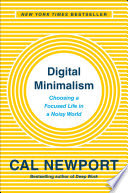
Average Rating
Informations
About the author
Cal Newport
Author
Calvin C. Newport is an American nonfiction author and full time professor of computer science at Georgetown University.
Digital Minimalism
by Cal Newport
Books Like Digital Minimalism
If you're looking for books similar to Digital Minimalism, here are some recommendations based on themes, tone, and narrative style.
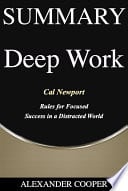
Deep Work
Cal Newport
A companion book by the same author that explores strategies for focusing without distraction in a digital world. Newport argues that the ability to concentrate deeply is becoming increasingly rare and valuable. The book provides practical techniques for cultivating intense focus and eliminating shallow work that doesn't create meaningful value. It offers a framework for transforming your work habits to produce high-quality output in less time.
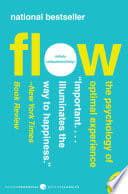
Flow
Mihaly Csikszentmihalyi
A seminal work on the psychology of optimal experience and concentration. Csikszentmihalyi explores the state of complete absorption in an activity, where individuals experience deep enjoyment and creativity. The book provides insights into how to create conditions for peak performance and satisfaction. It offers a framework for understanding focus and meaningful engagement.
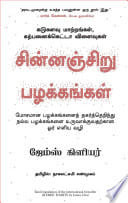
Atomic Habits
James Clear
A comprehensive guide to building good habits and breaking bad ones. Clear explains how tiny changes and improvements can lead to remarkable results over time. The book provides practical strategies for habit formation, focusing on systems rather than goals. It offers insights into how to make positive behaviors automatic and sustainable.
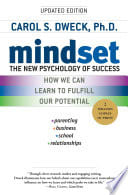
Mindset
Carol Dweck
A groundbreaking book about the power of our beliefs and how they can impact personal growth. Dweck introduces the concept of fixed versus growth mindsets and how they influence learning and achievement. The book provides strategies for developing a more adaptive and resilient approach to challenges. It offers insights into personal development and overcoming mental limitations.
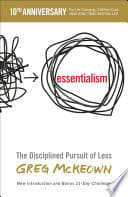
Essentialism
Greg McKeown
A book about doing less but better, focusing on what truly matters. McKeown advocates for systematically eliminating the non-essential to make room for things that are truly important. The book provides a disciplined approach to determining where our highest point of contribution lies. It teaches readers how to prioritize, say no to distractions, and create more meaningful engagement in work and life.
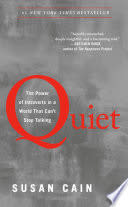
Quiet
Susan Cain
An exploration of introversion in a world that values extroversion. Cain argues for the strengths of introverted personalities and provides insights into how they can thrive in various environments. The book examines the power of solitude and deep thinking, which aligns with digital minimalism's principles. It offers a nuanced understanding of personality and productivity.
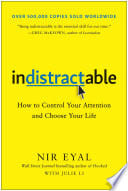
Indistractable
Nir Eyal
A guide to controlling your attention and choosing your life's direction in an era of constant distraction. Eyal provides a four-step model for becoming indistractable, focusing on understanding internal triggers and designing your environment for focus. The book offers practical techniques for managing digital interruptions and maintaining personal productivity. It explores the psychology behind distraction and how to overcome it.
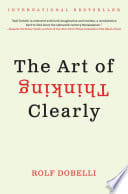
The Art of Thinking Clearly
Rolf Dobelli
A guide to recognizing and overcoming cognitive biases that cloud our judgment. Dobelli explores various mental shortcuts and logical fallacies that impact decision-making. The book provides strategies for more rational and clear thinking. It offers insights into improving cognitive processes and making more deliberate choices.
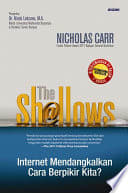
The Shallows
Nicholas Carr
An exploration of how the internet is changing the way we think, read, and remember. Carr argues that digital technology is rewiring our brains, reducing our capacity for deep thinking and concentration. The book examines the cognitive consequences of spending increasing amounts of time online. It provides a critical look at how digital media impacts our mental processes and attention spans.
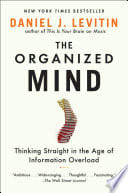
The Organized Mind
Daniel Levitin
A scientific exploration of how to manage information overload in the digital age. Levitin explains how our brains process information and provides strategies for maintaining cognitive organization. The book offers insights into managing attention, making decisions, and creating effective organizational systems. It combines neuroscience and practical advice for navigating complex information environments.
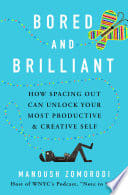
Bored and Brilliant
Manoush Zomorodi
An exploration of the importance of boredom in the digital age. Zomorodi argues that constant stimulation prevents creativity and deep thinking. The book provides a challenge to help readers reclaim their mental space and creativity. It offers practical strategies for managing digital consumption and embracing moments of unstructured time.
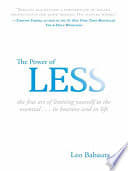
The Power of Less
Leo Babauta
A minimalist approach to productivity and life organization. Babauta advocates for simplifying one's life by focusing on what's essential and eliminating unnecessary complexity. The book provides strategies for reducing clutter, both physical and digital, to create more meaningful experiences. It offers practical techniques for streamlining work and personal life.
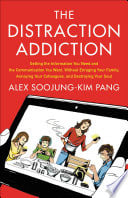
The Distraction Addiction
Alex Soojung-Kim Pang
An examination of how digital technology impacts our attention and well-being. Pang explores the psychological effects of constant connectivity and provides strategies for more mindful technology use. The book offers insights into creating a healthier relationship with digital devices. It provides practical techniques for managing digital distractions and maintaining mental clarity.

Digital Detox
Darren Hill
A practical guide to reducing digital dependency and reclaiming personal time. Hill provides strategies for managing technology use and creating healthier digital habits. The book offers insights into the psychological impacts of constant connectivity. It provides a comprehensive approach to creating a more balanced relationship with technology.
No account connected — sign in to comment.
